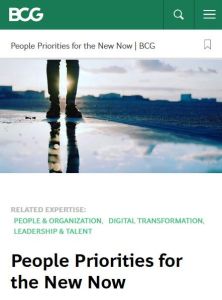
Rainer Strack, Allison Bailey, Deborah Lovic, Jens Baier, Reinhard Messenböck, Fang Ruan, Susanne Dyrchs and Ádám Kotsis
People Priorities for the New Now
Boston Consulting Group, 2020
What's inside?
Seven priorities for leading people amid and after the pandemic crisis.
Recommendation
When the COVID-19 coronavirus pandemic struck, organizations already undergoing transformation – or dragging their heels – found themselves suddenly catapulted into the future. A global team of experts from Boston Consulting Group offers clear, commonsense guidance to the new imperatives in work models, workforce management and leadership.
Take-Aways
- The COVID-19 pandemic crisis is ushering in a “new now.”
- Make smart work standard in your organization.
- Integrate support for employees’ physical and mental health into the workplace.
- Rethink your approaches to talent.
- Build flexibility into your workforce.
- Lead with empathy, and empower frontline managers.
- Let purpose drive your organizational culture.
- Transform your organization into a bionic one.
Summary
The COVID-19 pandemic crisis is ushering in a “new now.”
The pandemic has forced many companies into crisis mode. After a period of transition, companies are beginning to adjust to changed circumstances and environments: the new now.
“The crisis has catapulted the world five to ten years into its digital future.”
Seven challenges that companies had to tackle during the pandemic are now crystallizing into priorities for this new now. In some instances, these priorities represent accelerations of pre-existing trends.
Make smart work standard in your organization.
Many employers were moving toward new ways of working even before the pandemic crisis struck, but with the coronavirus, the transformation has become immediate and imperative. Employers will need to accelerate the shift to remote work, virtual collaboration, flexible paradigms, smart workspaces and digitized processes.
Integrate support for employees’ physical and mental health into the workplace.
To build a resilient workforce, employers will need to prioritize workers’ physical and mental health. Social distancing and tracking apps can help control coronavirus outbreaks, and tools to promote work-life balance can support employees’ mental health. Leaders must recognize that workers have been suffering emotional stress and that boosting their well-being in turn will increase their creativity and productivity.
Rethink your approaches to talent.
More than ever, organizations now need employees who can embrace change and engage in continuous learning.
“Now more than ever, companies are competing on the rate of learning and how fast their organizations and employees can absorb change and build capabilities. This will continue to be true in the future.”
Members at every level of the organization will need digital skills. Act now to obtain talent that other companies had to let go during the crisis. Consider novel ways to develop talent.
Build flexibility into your workforce.
The pandemic accentuates the need for new workforce strategies, including compensation systems. Consider extensive cross-staffing and deploy artificial intelligence (AI) to assist in HR decisions – for example, regarding future talent needs. Personalize employees’ work in terms of location, schedules and affiliation, and integrate performance and compensation systems with new work models.
Lead with empathy, and empower frontline managers.
Empathy allows leaders to connect with workers, which depends on continual communication.
“The need for empathy has been accelerated by the recent hardship and will soon become a hallmark of leading companies.”
Executives will need to support frontline managers when integrating new technologies and working models, including agile teams.
Let purpose drive your organizational culture.
The pandemic crisis has brought opportunities for learning to work with new technologies and in new ways. Take time to reflect on those lessons and give workers time to do so. Allow the organization’s purpose, vision and values to shift and align with changes the crisis has wrought – such as greater expectations for commitments to sustainability and social impact. Values and purpose have come to the fore.
Transform your organization into a bionic one.
The pandemic crisis is impelling companies to transform faster and more profoundly with technology at the core. Embrace advanced technologies like AI and new organizational forms like agile management. Also, take this opportunity to streamline and focus your organization’s operating model. Let the momentum of the crisis propel you forward.
About the Authors
Rainer Strack, Allison Bailey, Deborah Lovich, Jens Baier and Reinhard Messenböck are managing directors and senior partners at the Boston Consulting Group. Fang Ruan is a managing director and partner, and Susanne Dyrchs and Ádám Kotsis are associate directors.
This document is restricted to personal use only.
My Highlights
Did you like this summary?
Read the articleThis summary has been shared with you by getAbstract.
We find, rate and summarize relevant knowledge to help people make better decisions in business and in their private lives.
Already a customer? Log in here.






























Comment on this summary